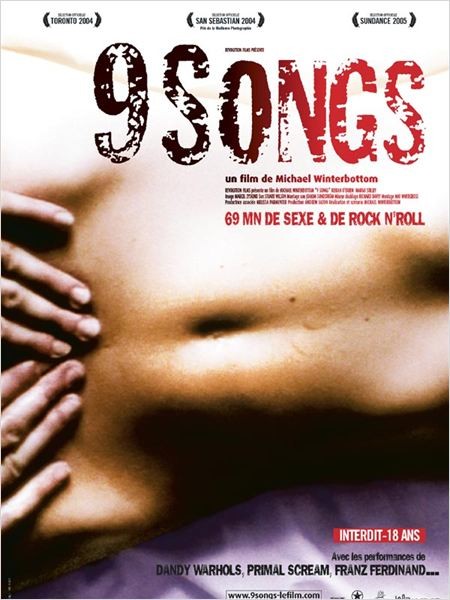

Two consecutive items from Harper’s Index (Harper Magazine, December 2010):
Percentage of Americans who believe that Stephen King wrote Moby-Dick: 4
Number of U.S. states in which it is legal to own a tiger without a license: 9
[11/18/20]
 Read more
Read more
From the Chicago Reader (February 2, 1990). — J.R.
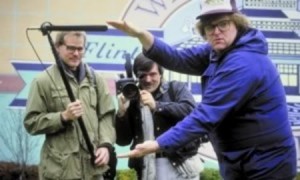
ROGER & ME
*** (A must-see)
Directed and written by Michael Moore.

There’s no question that you should see Roger & Me if you haven’t already. Michael Moore’s comic documentary about the devastation of Flint, Michigan, resulting from General Motors’ massive plant closings and job layoffs is the most entertaining American documentary to come along in years. Better yet, Roger & Me is radical in its angry critique of the Reagan era — its legacy of corporate greed and its cheerful heartlessness — in a way that makes contemporary Hollywood movies seem cowardly and conformist.
The story of how Michael Moore, a journalist from Flint with no prior filmmaking experience, financed his first feature is an American success story with an inspirational value all its own. Moore sold his house and furnishings, organized local bingo games, invested his settlement from a wrongful-discharge lawsuit against Mother Jones (where he briefly served as editor), and collected hundreds of small investments from Michigan residents to raise his $160,000 budget. After the film became a popular hit and prizewinner at several film festivals last fall, it was picked up by Warners for $3 million and is already well on its way to becoming an independent sleeper. Read more
From the Chicago Reader (May 5, 1989). — J.R.
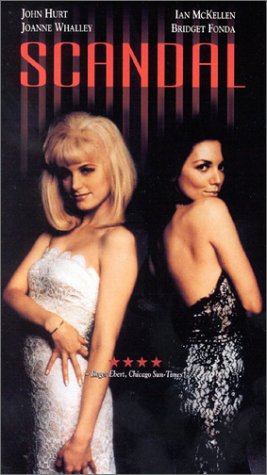
SCANDAL
*** (A must-see)
Directed by Michael Caton-Jones
Written by Michael Thomas
With John Hurt, Joanne Whalley-Kilmer, Bridget Fonda, Ian McKellen, Leslie Phillips, Britt Ekland, Daniel Massey, Roland Gift, and Jeroen Krabbe.

After applauding some of the forthright aspects of High Hopes and other recent English movies in this space two weeks ago, I’m happy to find my generalizations confirmed by a new English docudrama on the John Profumo-Christine Keeler sex scandal of 30 years back. Scandal, the first movie made on this subject, is good, clean, licentious fun.
While the titillating aspects of the story automatically place the film under the general rubric of “trash,” Scandal gleefully embraces its category without being unduly dumb or irresponsible about it. Starting off with an evocative period montage of the late 50s and early 60s, accompanied by the strains of Frank Sinatra’s recording of “Witchcraft,” the movie proceeds to unravel its complex narrative with a kind of polish that excludes any pretense of telling the “whole” story. (The project started out as a five-hour miniseries, and got boiled down to a feature after the BBC decided not to participate, but it is questionable whether the entire story could have been told even at miniseries length.) Read more
Written for a tribute to Danièle Huillet in Undercurrent, on the FIPRESCI web site, in March 2006. — J.R.

One thing worth mentioning about Danièle: I’ve never known anyone who knew her and Jean-Marie well enough to know absolutely for sure whether or not they were literally husband and wife. This might strike some as a mere technicality, but I think it signifies something more. Whether they went through an actual wedding ceremony or wound up living together; whether they considered having children; whether it was inaccurate or precise, impolite or perfectly okay to refer to them as “the Straubs”: these are all basically questions about how they defined themselves in relation to society. And the fact that most of us don’t know the answers points towards a larger uncertainty about whether they were true bohemians or eccentric traditionalists (not necessarily the same thing), or some combination of the two. (Danièle only began to be credited as coauteur belatedly, after their first few films. But was this because she gradually became more active as a filmmaker or because the two of them began to place a higher value on her participation? Again, I have no idea.)
I think the fact that their work provokes silence more often than discussion — a tribute in some ways to its continuing radicality and difference — may be partly to blame for this. Read more
This piece appeared in the Chicago Reader on December 10, 2004. One particular reason for reviving it is the happy news that The Exiles (see first illustration below) and all the Val Lewton horror films, including The Seventh Victim, which were relatively scarce items when they showed back then at the Gene Siskel Film Center, are now readily available on DVD, in excellent editions. Due to its lack of the usual auteurist credentials — specifically, the mediocre reputation of Mark Robson — The Seventh Victim continues to be the most neglected of Lewton’s greatest films, but it’s no longer hard to find. Burn, Witch, Burn is now out on Blu-Ray, and it seems that A Tale of Two Sisters is currently available in multiple editions in the U.S. and elsewhere — J.R.
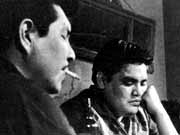
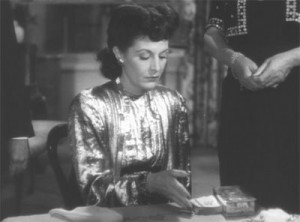
The Exiles **** (Masterpiece)
Directed and written by Kent Mackenzie
With Yvonne Williams, Homer Nish, Tommy Reynolds, and Rico Rodriguez
The Seventh Victim **** (Masterpiece)
Directed by Mark Robson
Written by Charles O’Neal and Dewitt Bodeen
With Kim Hunter, Jean Brooks, Hugh Beaumont, Erford Gage, Tom Conway, and Mary Newton
A Tale of Two Sisters * (Has redeeming facet)
Directed and written by Kim Jee-woon
With Yeom Jeong-a, Im Soo-jung, Moon Geun-young, and Kim Kab-su
Burn, Witch, Burn *** (A must see)
Directed by Sidney Hayers
Written by Richard Matheson and Charles Beaumont
With Janet Blair, Peter Wyngarde, Margaret Johnston, and Anthony Nicholls
By Jonathan Rosenbaum
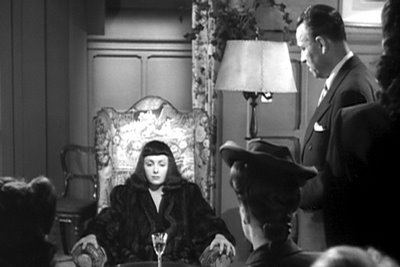
Few movie-industry executives -– and not just in the U.S. Read more
I can very happily report that since I first published this article, in the February 6, 2004 Chicago Reader, a few Barnet films have become available on DVD, including the two I wrote about, and a few more are reportedly on the way from Ruscico, a Russian label that has been issuing subtitled DVDs that I wrote about here. Earlier, Image Entertainment brought out Outskirts and The Girl with the Hatbox on a single DVD, and in France, www.bachfilms.com released both By the Bluest of Seas (under its French title, Au bord de la mer bleue), which Ruscico has subsequently released as well, and the 1943 A Good Lad/Men of Novgorod (again, under its French title, Un brave garçon). More recently, I showed clips from Okraina as well as other early Russian talkies (Deserter and Enthusiasm) in a course, “The First Transition: World Cinema in the 30s”, Kevin Lee has made a wonderful video about By the Bluest of Seas with a rapturous critical commentary written by Nicole Brenez, and in the summer of 2011, Il Cinema Ritrovato in Bologna presented a comprehensive Barnet retrospective, most of which I was able to attend.
Recently reseeing By the Bluest of Seas at the Arsenal in Berlin, as part of a program devoted to Frieda Grafe’s favorite films, I was more blown away than ever, and it struck me that the film could be viewed in some ways as an erotic view of collectivism and socialism, with the sea serving as a perfect emotional metaphor — and a perfect sort of reply to what Luc Moullet maintained in his review of Jet Pilot, which implied that eroticism, as in that film and The Fountainhead, was always tied in some fashion to right-wing thinking. Read more
From the Chicago Reader (March 12, 2004). — J.R.
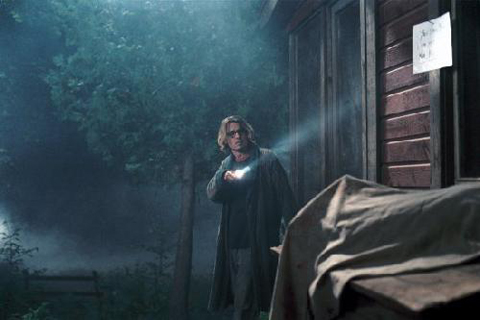
Secret Window
* (Has redeeming facet)
Directed and written by David Koepp
With Johnny Depp, John Turturro, Maria Bello, Timothy Hutton, Charles S. Dutton, and Len Cariou.
I’ve seen four movie adaptations of Stephen King books that have writers as heroes — The Shining (1980), Misery (1990), The Dark Half (1993), and now Secret Window — and I know of a few others. This isn’t necessarily self-indulgent on King’s part. An author this prolific would eventually run out of material if he didn’t use his own experience as a writer, and besides I happen to prefer the plotlines of The Shining and Misery to those of other King stories I know. He understands what it means to be a writer driven crazy by his own demons (in The Shining) as well as by some version of his public (in Misery), and even though he makes the heroes in both cases fairly dislikable, we wind up ensnarled in their dilemmas anyway. He also seems to have an astute take on writer’s block, suggesting that writing too much and repeating oneself can be as much a form of creative blockage as writing too little. Read more
From the Chicago Reader in late August, 2005. — J.R.

Working without a script, the edgy British independent Michael Winterbottom (24-Hour Party People) shoots a young couple (played by Kieran O’Brien and American nonprofessional Margo Stilley) having real sex and alternates these scenes with numbers from nine London concerts (mostly rock) that their characters attend over a few months. Beautifully shot on DV by Marcel Zyskind, with minimal dialogue but voice-over narration from O’Brien, this 2004 feature is short on story and character yet usually holds its own as spectacle. The music and the body types may be familiar to a fault, but the performances are expressive. 69 min. (JR)
Read more
From the Chicago Reader (September 2, 1994). — J.R.

** MY LIFE’S IN TURNAROUND
(Worth seeing)
Directed and written by Eric Schaeffer and Donal Lardner Ward
With Schaeffer, Ward, Lisa Gerstein, Dana Wheeler Nicholson, Debra Clein, Sheila Jaffe, John Sayles, Martha Plimpton, Phoebe Cates, and Casey Siemaszko.

As a member of the New York film festival’s selection committee, I’ve seen or sampled close to 150 films (shorts and features) this summer that haven’t yet opened in the United States, about a quarter of them American. And I’ve come to a few rough conclusions about the differences between new American movies and those recently made elsewhere, and had a few thoughts about trends in American studio and independent pictures. All of them are fairly depressing.
One major difference between foreign and American fiction features stands out: those made in other countries tend to be about how people live today, and those made here tend to be anything but. The few American movies that spring to mind as exceptions are already being regarded within the business as uncommercial — difficult, marginal works earmarked for “special” audiences.
This state of affairs is partly the result of new definitions of “universality” developed by the studios over the past several years, which generally suppose that the ideal movie viewer has the taste and sensibility of a ten-year-old boy: think of the well-received Speed, Forrest Gump, and True Lies, for instance, none of which betrays a view of the adult world any more developed than those in The Lion King and The Mask. Read more
From the Chicago Reader (January 9, 1998). — J.R.
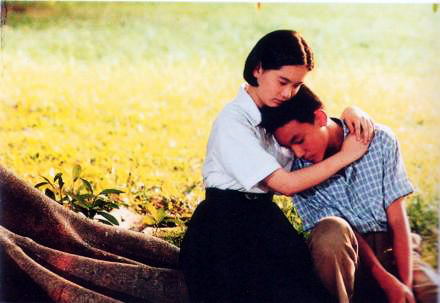
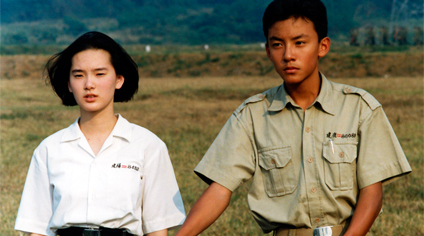
Do movies come from the tooth fairy? When you consider the way that they’re often treated in this culture — in particular, what films are made available and are therefore considered “important” — the working hypothesis appears to be that movies magically appear and disappear. The general idea is that the designated tooth fairies of product flow — producers, directors, distributors, exhibitors, and critics — make things happen and the only thing viewers are supposed to do is show up for the movie, rent the video, or decide to do neither.
Most viewers understandably don’t want to be bothered with the machinations that determine which movies turn up and which don’t. To tell the truth, most critics don’t want to be bothered with these matters either. But sustaining such innocence may involve too high a price. Readers who complain that 1997 was a mediocre year for movies are probably counting only the multiplex entries, only one of which made it onto my ten-best list — though why anyone would eliminate everything else in a city like Chicago remains a mystery, perhaps explainable by saturation advertising, mass-media complicity in making everything but multiplex movies look unimportant, and the supposed inconvenient locations of some theaters. Read more
From the Chicago Reader (June 27, 1997). — J.R.
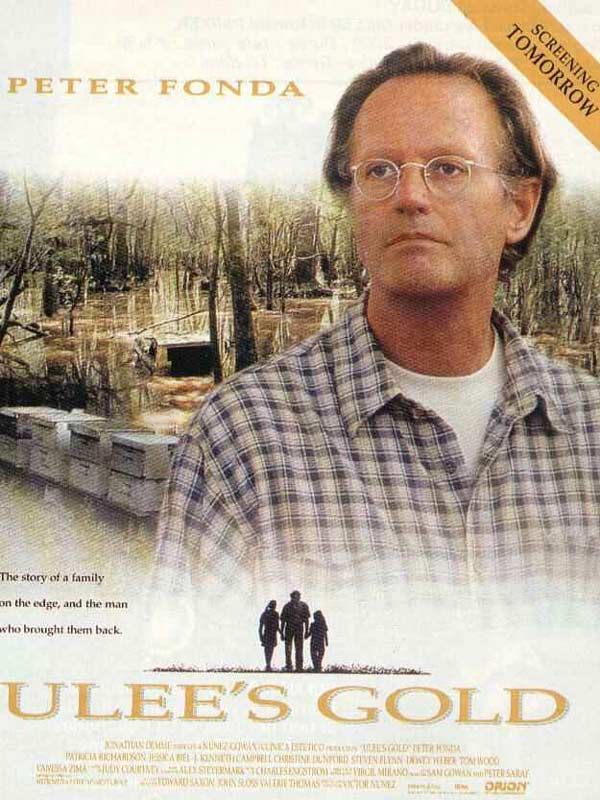
Ulee’s Gold
Rating ** Worth seeing
Directed and written by Victor Nunez
With Peter Fonda, Patricia Richardson, Vanessa Zima, Jessica Biel, Christine Dunford, J. Kenneth Campbell, Steven Flynn, Dewey Weber, and Tom Wood.

The character-driven stories in all four of writer-director Victor Nunez’s features to date — Gal Young ‘Un, A Flash of Green, his masterpiece Ruby in Paradise, and now Ulee’s Gold — are defined by their regionalism: Nunez operates exclusively as a Florida independent. Whether he’s adapting a Marjorie Kinnan Rawlings short story set in the 20s or a John D. MacDonald novel (his first two films) or writing an original script (the second two), Nunez bases his art on a sense of place so solid that the texture of the settings is part of his subject.
The fact that all his films are relatively slow moving also has something to do with the Florida settings. Former residents of that state have told me that his movies capture not only a sense of the place but its rhythms, and judging from the novels with Florida settings I’ve read in recent years — John Updike’s Rabbit at Rest and the three wonderful Hoke Moseley novels of Charles Willeford (Miami Blues, Sideswipe, and New Hope for the Dead) — this isn’t just Nunez’s take on the region. Read more
From the Chicago Reader (February 1, 2002). — J.R.

Diamond Men
*** (A must-see)
Directed and written by Daniel M. Cohen
With Robert Forster, Donnie Wahlberg, Bess Armstrong, Jasmine Guy, George Coe, Jeff Gendelman, Nikki Fritz, and Shannah Laumeister.
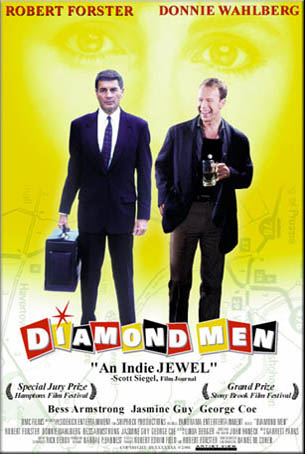
It’s astonishing how few Hollywood movies tell us anything about the way we spend a third or more of our lives — at work. Maybe this is because the standard industry perception is that people don’t like to think about that part of their existence when they go to movies, that people want to keep their professions and pleasures separate and mutually alienated. The assumption seems to be that work isn’t supposed to be fun but movies are.
Since I don’t have this bias, I found myself uncommonly excited watching Diamond Men, an independent first feature by writer-director Daniel M. Cohen that stars Robert Forster and is playing this week at the Music Box. I have no particular interest in the diamond trade, but I was thrilled to have the opportunity to see a movie that taught me something about what it’s like to drive through small towns in Pennsylvania selling diamonds to jewelry stores — especially since its lessons are being propounded by someone as knowledgeable about the subject as Cohen (who, reports Philadelphia Inquirer film reviewer Carrie Rickey, is a third-generation diamond man from Lancaster) and articulated by an actor as likable as Forster. Read more
From the Chicago Reader (March 1, 2002). — J.R.
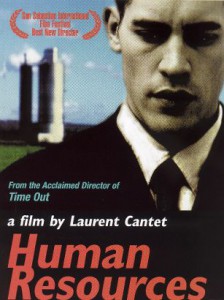
In Laurent Cantet’s 1999 French feature, written with Gilles Marchand, a student at a Paris business school returns home to Normandy to intern at the factory where his father has worked for 30 years. When the son and other workers go on strike and the antiunion father is let go, the son finds himself and his father on opposite sides of the fence. This sharp, convincing, and utterly contemporary political film calls to mind some of Ken Loach’s work, full of passion as well as precision. Cantet’s subsequent film, L’Emploi des Temps (Time Out), a prizewinner in Venice, shows an even more masterful grasp of the business world and all that it entails. This filmmaker is definitely someone to get acquainted with. In French with subtitles. 100 min. (JR)
 Read more
Read more
From the Chicago Reader (August 23, 2002). — J.R.
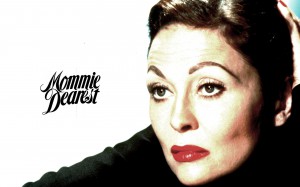
In spite of its reputation, and thanks in part to Faye Dunaway’s remarkable performance as Joan Crawford, this 1981 adaptation of Christina Crawford’s memoir about her driven, abusive mother is arguably too good to qualify as camp, even if it begins (and fitfully proceeds) like a horror film. Director Frank Perry, who collaborated with three others (including producer Frank Yablans) on the script, gives it all a certain crazed conviction. With Diana Scarwid, Steve Forrest, and, as Louis B. Mayer, Howard da Silva. PG, 129 min. (JR)
 Read more
Read more
From the Chicago Reader (July 1, 2002). — J.R.
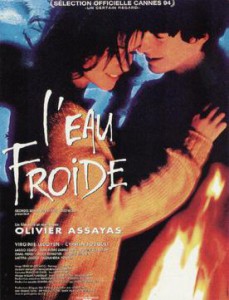

Not long before embarking on his comedy Irma Vep, Olivier Assayas directed this powerful 1994 feature about doomed teenage love as part of the excellent French TV series All the Boys and Girls in Their Time, in which various filmmakers (including André Téchiné, Chantal Akerman, and Claire Denis) dramatized stories set during their teenage years, scoring them with the pop music of the period. Assayas’s contribution, perhaps the most affecting in the whole series, takes place on the outskirts of Paris in 1972. (Having lived in France during that period, I can report that his grasp of its countercultural lifestyles is uncanny.) Virginie Ledoyen and Cyprien Fouquet are letter-perfect as two 16-year-old delinquents from broken homes — the former periodically sent to an asylum by her Scientologist mother and boyfriend, the latter raised by a single father (New Wave regular Laszlo Szabo) — and when they run away together, one can’t imagine that they have anywhere else to go. The beautiful and heartbreaking plot culminates in a party at and around a country house, and Assayas’s sustained treatment of this event — the raging bonfire, the dope, the music and dancing — truly catches you by the throat. Read more














